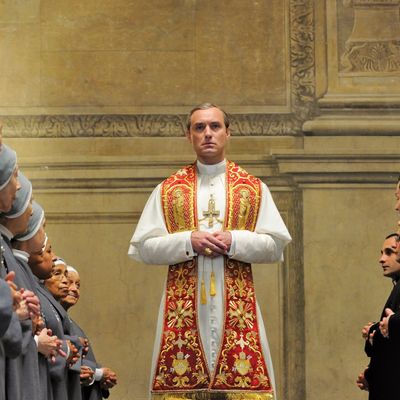
You should know going into HBO’s The Young Pope that the series has plausibility issues. One is that the titular pontiff, Pius XIII (Jude Law), is a chain-smoking Diet Cherry Coke addict who hails from Brooklyn. The five episodes sent to critics contain little information about how such an unprecedented development could occur, and eventually you have to just accept that it’s not something the show is interested in exploring — although we do get flashbacks to the hero’s youth as a sweet boy abandoned by his hippie parents and raised by an earthy, funky nun (Diane Keaton, of all people) whom he calls Mama. Another credibility hurdle is that this pope is, well, young — 46, according to a throwaway line — and looks like Jude Law. “I know, I’m incredibly handsome,” Pius tells the prime minister of Greenland (Carolina Carlsson), who’s as scrumptious as he is. “Please, let’s try to forget about that.” But series creator, co-writer, and director Paolo Sorrentino (Il Divo, Youth) doesn’t make it easy; he gives his leading man the rock-star treatment, shooting Law in Scorsesean slow motion as he strolls through Vatican corridors while rock and pop tunes blast on the soundtrack, lighting his angular face like a marble bust of Saint Francis of Assisi, and even stripping him down for an HBO-mandatory butt shot. (His Holiness has been hitting the StairMaster.)
What, exactly, are we looking at? This is not a series where you can immediately tell why the storyteller felt that he had to tell this particular story. The Young Pope is less urgent and focused than contemplative and playful. The first three episodes amount to seductively photographed throat clearing. The sense of humor ranges from self-deprecating (“I’m not profound, I’m presumptuous,” says Pius) to goofy (one episode begins with a man doting on a sheep that he believes is the reincarnation of the Virgin Mary). And it rarely finds cinematic ways to convey the spiritual longing and/or torment expressed by its various characters, preferring instead to address these matters and others in ruminative dialogue. The tone and pace are all over the map; The Young Pope is five or six shows in one, and not necessarily in a good way. There are tense meetings between Pius and spiritual and political leaders, Godfather-esque scenes of the pope neutralizing internal power plays against him, and lyrical montages of daily life at the Vatican (including shots of nuns playing soccer; one is so skilled that she could nutmeg Lionel Messi). There are dream sequences (including an opening image of Pius crawling through a field of dead babies) and quasi-confessional sections where Pius stops just short of breaking the fourth wall, à la Frank Underwood or Ferris Bueller (or Alfie, whom Law played in a 2004 remake).
Sorrentino’s attitude toward Catholicism and the modern Church is slippery, too. The series initially makes Pius seem like a papal answer to President Jed Bartlet on The West Wing — i.e., a sentimentalized liberal fantasy — but once we get to know him, he discloses an authoritarian streak as well as a desire to go back to the most basic of basics. Pius wants to ban merchandise with his own image on it because it diverts God’s glory onto a representative, and he delivers his first public homily in silhouette. When he hears the knockout wife of a Swiss Guardsman (Swimming Pool’s Ludivine Sagnier) weeping because she can’t have kids, he snaps, “Believers don’t cry.” It’s an instant catchphrase, on the order of “Coffee is for closers.” He’s a tough-love pope: sometimes ruthless, occasionally compassionate, but more inscrutable than anything else. Like this show.
Still, the sheer novelty of The Young Pope makes for compelling viewing even when the show seems to be throwing ideas and images against the Vatican walls to see if anything sticks. Law’s slightly sour charisma and Sorrentino’s prankish sense of humor are such a potent combination that the more high-stakes moments — such as Pius facing off against his mentor, played by the formidable James Cromwell — make less of an impression than the many rambling scenes in which the pope holds forth on whatever subject the episode finds interesting at that moment, from the history of Catholics in Greenland to the inverse relationship between the visibility of celebrities and their mystique. (Pius cites Stanley Kubrick, J. D. Salinger, and Banksy as models for his PR strategy.) This is, in many ways, one of the weirdest, most counterintuitive programs ever to get a green light from HBO, and that alone merits the benefit of the doubt for now — although if the history of faith teaches us anything, it’s that states of grace are fleeting.
*This article appears in the January 9, 2017, issue of New York Magazine.


